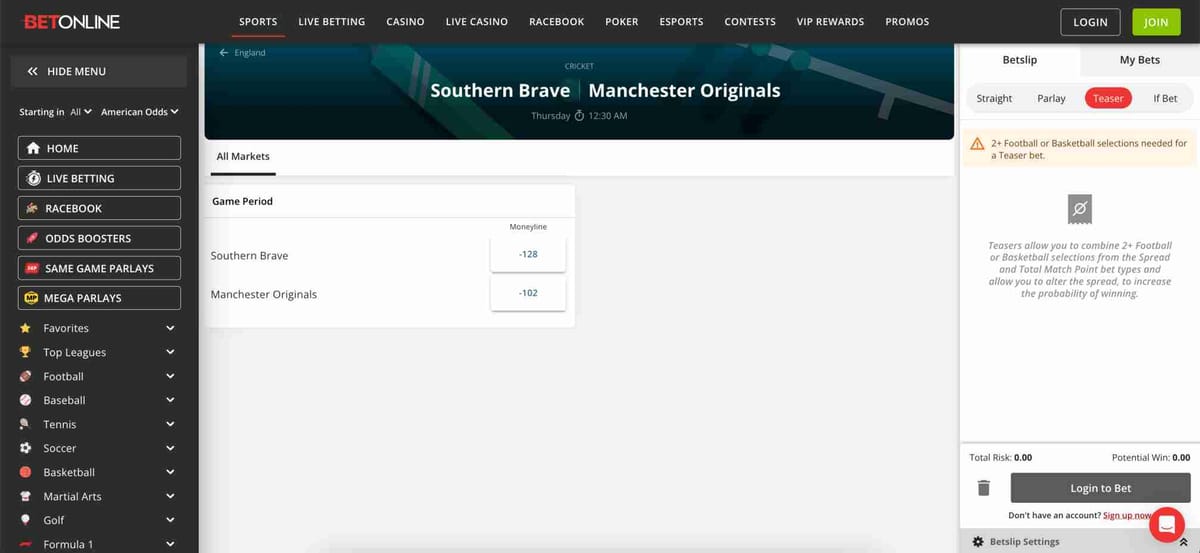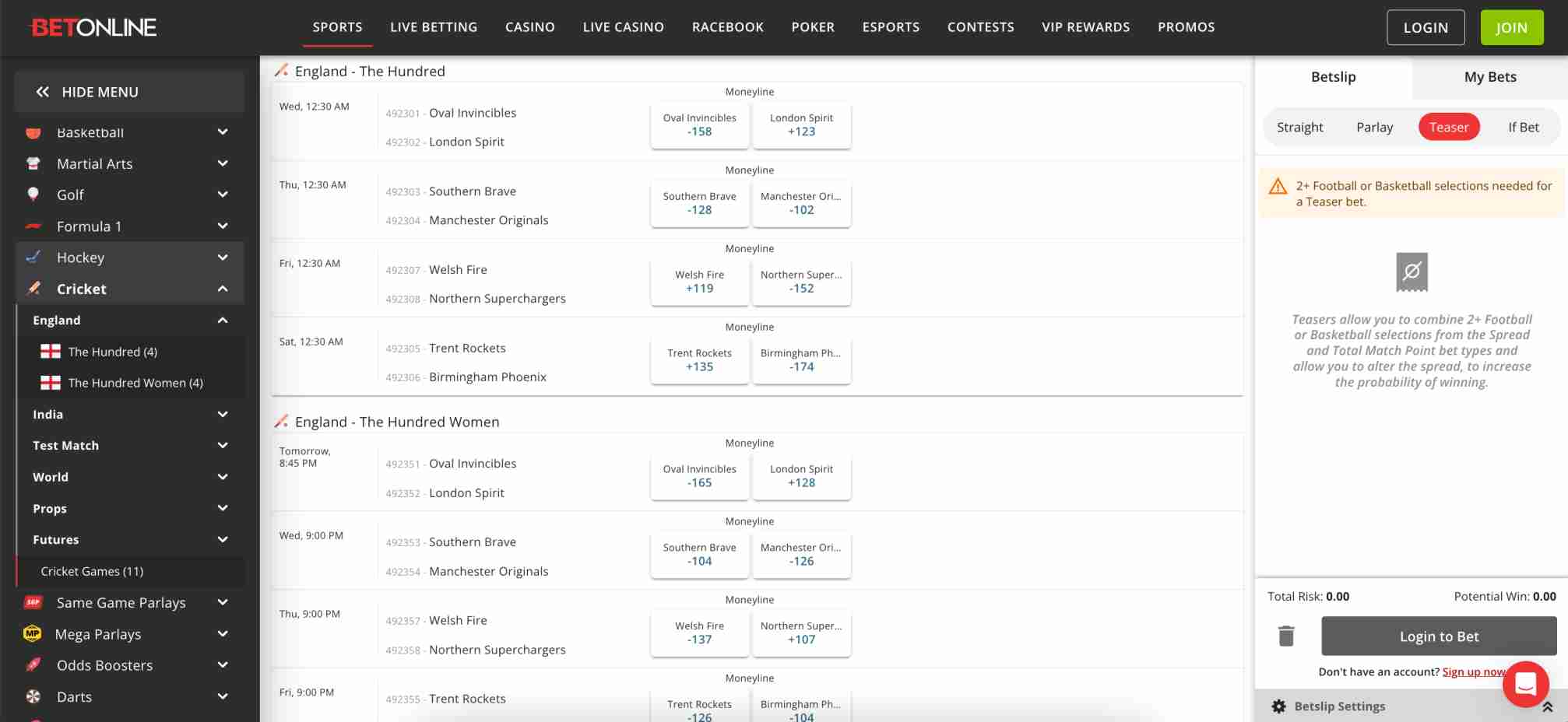What Happens If a Cricket Match Is Tied in BetOnline? Rules Explained
Tied cricket matches can affect your BetOnline wagers in unexpected ways. Learn how different bet types react so you’re never caught off guard.

If a cricket match ends in a tie on BetOnline, what happens to your bet depends entirely on the type of market you picked.
In many standard win/lose bets, a tied result is treated as a push, meaning your stake is simply refunded with no win or loss.
But in other markets, such as what happens if a cricket match is tied in BetOnline, specific outcomes—like betting directly on a tie—can result in a full payout, sometimes at long odds.
The key is knowing how each bet is settled and which exceptions apply, especially with Super Overs or “tie no bet” options. I
n this article, we’ll break down the different markets and explain exactly how tied cricket matches are handled so you don’t get caught off guard.
How BetOnline settles tied cricket match bets
Tied results in cricket aren’t super common, but they do happen—especially in limited-overs formats like T20s or ODIs. When they do, BetOnline has clear rules in place depending on how your bet was structured.
For traditional match winner markets, if a game ends in a tie and there’s no provision for a Super Over or tiebreaker (or if that tiebreaker doesn't count toward settlement), BetOnline usually grades the bet as a push.
That means your original stake is returned, no win, no loss.
On the other hand, if you placed a bet on a market labeled “tie,” and the match ends exactly level with both teams having the same score, that bet wins—and it often comes with pretty high odds.
So the bottom line? Ties don’t mean the same thing across all bets. It really depends on what market you chose.
Tied cricket match rules in specific BetOnline markets
Here’s what I’ve seen when helping others or placing bets myself on BetOnline—these are the most affected markets when a cricket match ends in a tie:
Match result (three-way vs. two-way markets): In a three-way market (Team A / Team B / Tie), a tie result pays out if you selected “Tie.” But in a two-way market (often labeled “winner”), a tie usually results in a push and the bet is refunded.
Tie no bet: If you selected “Tie No Bet” (sometimes shown as “Draw No Bet” in multi-day cricket), then your stake is refunded in the event of a tie. This is a safer option if you want to back a team but avoid losing due to a tied finish.
Outright tournament bets: Ties are extremely rare in outrights, but if two teams finish level on points or share a title, BetOnline typically applies dead heat rules—meaning your payout may be split, depending on the specific market.
Method of victory: Markets like “method of victory” (e.g., win by runs or wickets) often get voided if the match ends in a tie, unless the sportsbook explicitly lists “tie” as an option.
Prop bets and player markets: Props like “Top Run Scorer” or “Most Sixes” are unaffected by the match result itself. But if your prop is linked to a team winning or a specific match outcome, a tied result may void the bet.

Do Super Overs count in BetOnline settlements?
Great question—because a lot of players assume a Super Over decides everything. At BetOnline, this comes down to the rules set per market.
In some competitions (especially T20 leagues or ICC events), tied matches go to a Super Over to determine a winner.
But BetOnline often does not count Super Over outcomes for standard match result markets unless explicitly stated.
That means even if your team “wins” in the Super Over, your bet might still be a push if the match was tied at the end of regular play.
Always double-check the market rules by clicking the little info icon next to the bet slip—especially for things like BetOnline enhanced verification, which can affect settlement eligibility. It’s saved me from surprises more than once.
How to avoid confusion with tied cricket match bets on BetOnline
If you’re betting regularly on cricket at BetOnline, here’s what I recommend based on my own experience:
- Read the market description carefully before placing your bet, and if you're new, it's also worth understanding whether BetOnline requires KYC upfront
- When in doubt, use “Tie No Bet” to protect your stake
- Don’t assume Super Over results are always counted
- Look at previous match rules for the specific tournament—BetOnline usually follows the competition’s official format
And if you're ever unsure, BetOnline’s live chat support is pretty responsive. I’ve asked about bet grading a few times mid-match, and they’ve been helpful with clarifications.
Final thoughts on what happens if a cricket match is tied in BetOnline
To wrap it up: if a cricket match is tied in BetOnline, your payout (or refund) depends on the market you bet into.
In most simple winner markets, it’s treated as a push and you’ll get your money back. But if you wagered on a tie explicitly or chose tie-related props, you could land a nice payout.
Cricket’s unpredictable nature is part of the thrill—and ties are just one of those curveballs. Knowing how BetOnline handles them means you’re better prepared to make smart, confident bets.
FAQs
What happens if a cricket match is tied in BetOnline?
In most standard winner markets, BetOnline grades a tied match as a push and refunds your stake unless the market specifically includes a tie outcome.
Does BetOnline count Super Over results?
Super Overs are usually not counted in BetOnline settlements unless the market explicitly states otherwise, so even a Super Over win may not change your bet result.
How does “Tie No Bet” work on BetOnline?
With Tie No Bet, your stake is refunded if the match ends in a tie, offering protection against tied results while still letting you back a specific team.
Are prop bets affected by a tied cricket match?
Most player props, like Top Run Scorer or Most Sixes, are not impacted by the overall match result, so ties usually don’t void those bets.
What is BetOnline’s rule for match result markets?
In a three-way match result market, a tie pays if selected; in a two-way market, ties are typically refunded as a push.
